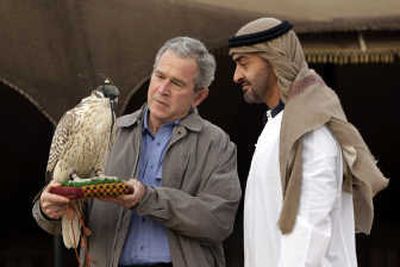Bush says Iran a threat to all

ABU DHABI, United Arab Emirates – President Bush on Sunday described Iran as the world’s leading state sponsor of terrorism and called on Arab allies to help his administration curb the threat “before it’s too late.”
In a speech at an opulent, palace-style resort here Sunday, Bush accused Iran’s militant Shiite Muslim government of spending hundreds of millions of dollars to foment instability in Iraq, Lebanon, Afghanistan and the Palestinian territories, while ordinary Iranians face economic hardships and political repression.
“Iran’s actions threaten the security of nations everywhere,” Bush said. “So the United States is strengthening our longstanding security commitments with our friends in the Gulf and rallying friends around the world to confront this danger before it’s too late.”
But Bush appears unlikely, based on the regional reaction to his address, to find many Arabs to heed his alarms against Iran, a powerful neighbor and trading partner. Few endorsed his speech’s other theme – a vision of “free and just society” featuring broad political participation and a voice for moderate Muslims in a region where money and family are common keys to leadership.
Even political analysts here who share Bush’s democratic vision said that his speech painted over the daily reality for most inhabitants of the Middle East, an oil-rich region where power is largely inherited and human rights violations abound.
Whether chastising Iran or praising Palestinian elections, analysts said, Bush left out key facts that would have offered a messier – and more true-to-life – portrait of the modern Middle East.
“Iran is a neighbor; we have to deal with that,” said Ambassador Ibrahim Mohieldin, director of the Arab League’s Americas department. “The U.S. is thousands of miles away from Iran – it’s OUR national security that will be affected” if leaders agree to keep Tehran isolated at Washington’s request.
Bush heaped praise on his hosts, the rulers of the United Arab Emirates, for luring foreign investment and “building a prosperous society out of the desert.” Left out, noted analyst Manar Shorbagy, an associate professor who teaches a course on U.S. politics at the American University in Cairo, was the ill-fitting fact that Iran is the country’s No. 1 trade partner.
Also unmentioned was the UAE’s role as an important conduit for Iranian imports in spite of U.S.-backed economic sanctions. Moreover, a large and thriving Iranian expatriate community is central to commerce and society in Abu Dhabi and the commercial hub of Dubai.